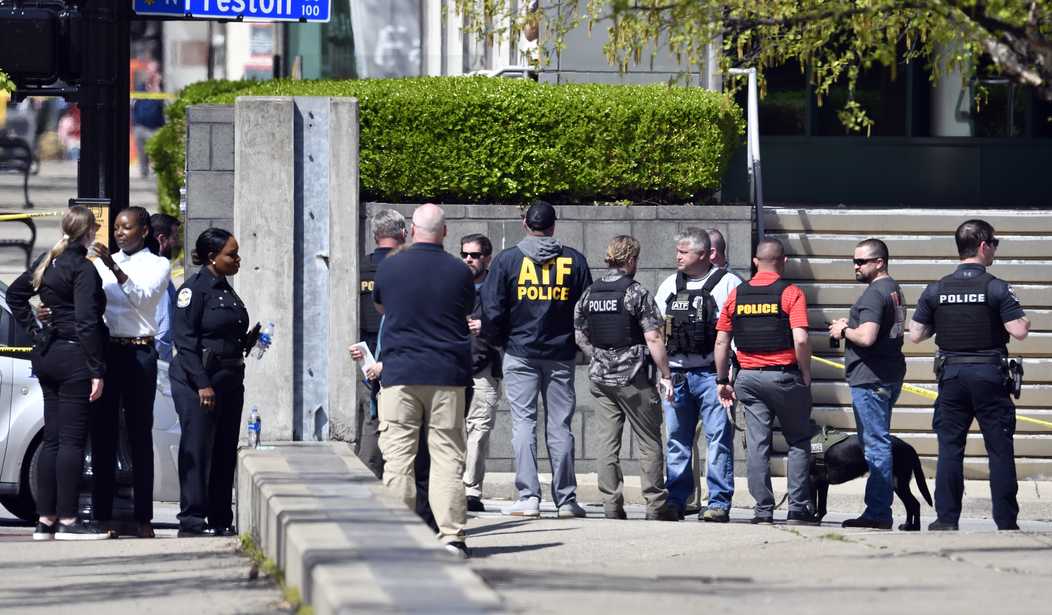There were rumors and unconfirmed reports back in April that the employee of Old National Bank in Louisville, Kentucky who opened fire and murdered five of his co-workers was motivated by a desire for more gun control laws, and now Louisville police have confirmed that was indeed the case.
This week authorities disclosed portions of a journal kept by the killer in the days before he carried out his attack that reveal his desire to “make an impact” on the gun control debate, including a statement that his victims “did not deserve to die, but because I was depressed and able to buy ___ (guns?), they are gone.”
In another journal entry the killer wrote, “Perhaps this is the impact for change – upper class white people dying. I certainly would not have been able to do this were it more difficult to get a gun.”
According to the 64-page report released by police, gun control may not have been the entire motivation for the attack, but was definitely a primary factor.
The first journal entry is dated April 3rd, one week prior to the shooting. The journal entry describes [name redacted by Bearing Arms] viewing his life as pointless and the need to make an impact or effect change. [Name redacted] then proceeds to list issues that weigh on him, such as inflation, climate disaster, access to guns, lack of mental health case [sic], and politicians with no interest in helping people. [Name redacted] then goes on to write his struggle with his depression and how he is unable to escape it even though he has been trying for the past year with therapy, medications, and other self-care methods. The next day after this journal entry is when [name redacted] purchases his rifle.
[Name redacted] writes his “goals” to “tell my story” and “impact change- gun access”. [Name redacted] then proceeds to list his “story” involving having good friends and family and doing everything right in his professional and social life. [Name redacted] goes on to say he was able to buy a gun and highlighting again “politicians with no interest in making things better” and “stop letting anyone buy guns or this will keep happening.”
I personally don’t think we should pay much attention to the particulars of any manifesto created by a deranged individual before they carried out their murderous assault, but I recognize that a lot of folks feel differently. Certainly, gun control activists and anti-gun politicians have no problem delving into the details of a disturbed killer’s stated motivations when they believe it’s helpful to their cause, though from what I’ve seen they’ve been utterly silent about the twisted rationale penned by the murderer in Louisville. If they want to argue that conservative media or “right-wing extremism” is causing some lunatics to commit mass murder, then I think it’s fair to question whether anti-gun rhetoric is in any way to blame for this particular atrocity.
If there is any value to be found in poring over the inner thoughts of the twisted souls responsible for committing mass murder, I think it’s found in looking for the commonalities between these killers. The motivations will vary, but a common theme for many of these killers is a desire to not just make a statement, but to make themselves known. That’s one reason why, whenever possible, we don’t use the names of these individuals here at Bearing Arms. I don’t care to add to their infamy, especially knowing there’s a sick subculture in our society that glorifies and idealizes these killers and the crimes against humanity they’ve committed.
There’s nothing wrong about wanting your life to have an impact on others, just as there’s nothing inherently evil in seeking fame and the adulation of strangers. I think most of us would like to believe that our time here on earth will make a difference in someone’s life. But we see what happens when that desire turns into toxic narcissism and is amplified and exacerbated by our social networks; not only in the rare instances of an active shooter but in the more common social media feuds and online beefs that lead to offline violence and killings. Infamy is easier to achieve than becoming famous for good deeds, and for a small segment of our society, the tradeoff is acceptable.
Banning social media isn’t the answer any more than banning guns would solve this problem. Improving access to mental health is critically important, but it won’t stop every one of these attacks either. The killer in Louisville was in therapy and had been voluntarily committed to a mental hospital the year before he carried out his plot. I’m not sure we can ever completely negate the threat posed by these deranged individuals, though we can and should exercise our right to self-defense so we’re hopefully in a position to stop these attacks when they do take place.
We’re never going to find a logical reason for murdering innocent lives in pursuit of their twisted agenda; whether it’s a desire for more gun control, to punish Christians, or to start a race war. Trying to make sense of these senseless acts is an exercise in futility. I won’t pretend to have all the answers myself, but I do know that they won’t be found in the ramblings of a deeply disturbed killer, no matter their stated motivation.









